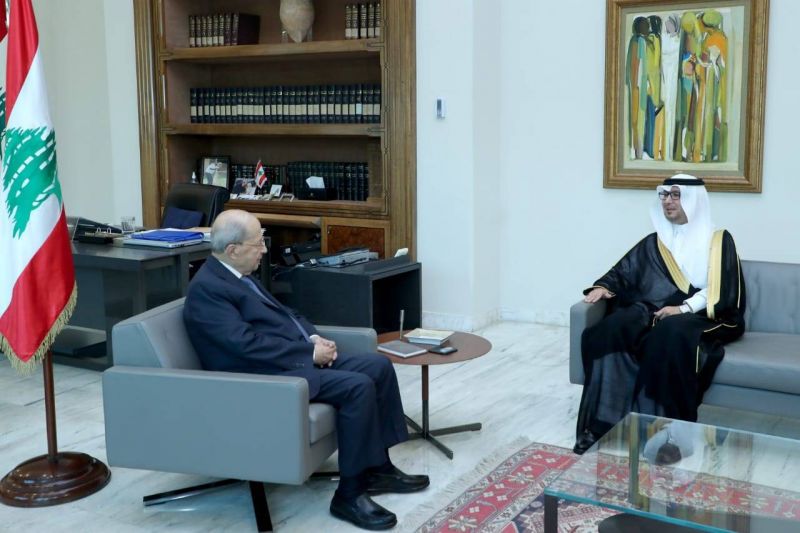
Lebanese President Michel Aoun (left) receives Saudi Arabia's Ambassador to Lebanon Walid Bukhari on Oct. 17, 2022 at the Baabda Palace. (Credit: Twitter/@LBpresidency)
BEIRUT — A dinner that was due to be held Tuesday at the Swiss Embassy in Beirut and to which various Lebanese political representatives were invited has been indefinitely postponed, after news that the event caused controversy on the local political scene, including tweets from the Saudi ambassador to Lebanon that were interpreted in some camps as evidence of Riyadh's opposition to the event.
Not a dialogue conference
The dinner's postponement was confirmed to L'Orient-Le Jour by the Swiss Embassy in a statement.
"Over the last couple of months, Switzerland, in collaboration with the Swiss-based organization Center for Humanitarian Dialogue, was in contact with the full spectrum of political Lebanese as well as regional and international actors to prepare for consultative discussions, not for a dialogue conference," the embassy explained.
"It is Switzerland's tradition to offer good offices when asked to do so. The planned discussions are the result of previous consultations with the full spectrum of political Lebanese, as well as regional and international actors, in full respect of the Taif Agreement and the Lebanese Constitution," the Swiss diplomatic mission added.
"The informal dinner that was to take place this Tuesday at the Swiss residence aimed to further brainstorm. The names that circulated in the media do not reflect the actual guests. The dinner was postponed to a later date," the statement concluded.
Bukhari meets with Aoun and Berri
Before the release of this statement, news of the Swiss Embassy dinner was beginning to stir controversy on the political scene and in the press. According to local media reports, the Swiss initiative appeared to have displeased Riyadh, with Saudi Ambassador to Lebanon Walid Bukhari on Sunday evening tweeting a message recalling the importance of the 1989 Taif agreement concluded in Taif, Saudi Arabia, that ended the Civil War in Lebanon.
Bukhari was then received Monday morning at the Presidential Palace in Baabda by the head of state, Michel Aoun.
The ambassador left Baabda without making any statement; however, according to a statement from the Presidential Palace issued in the early afternoon, the head of state discussed with Bukhari "Lebanese-Saudi relations and ways to develop them on all levels."
The two officials also discussed "the assistance offered by the kingdom to Lebanon, especially on the social and humanitarian levels," the statement continued, adding, "Ambassador Bukhari stressed the kingdom's commitment to Lebanon's unity and its Arab anchorage, under the national principles contained in the Taif Agreement, which protected Lebanon and ensured its stability."
According to the presidency, the Saudi diplomat also insisted on keeping to "constitutional deadlines" in reference to the presidential election that must take place before the end of Aoun's term on Oct. 31.
The Saudi diplomat was also received in Ain al-Tineh by Parliament Speaker Nabih Berri later Monday but did not make any comments after the meeting. No appointment has been set by the Grand Serail for a meeting between caretaker Prime Minister Najib Mikati and Bukhari.
'Disintegration of coexistence'
"The Taif agreement is a binding contract to strengthen the foundations of a pluralistic Lebanon," Bukhari wrote on Twitter on Sunday. "The alternative is not another pact but the disintegration of coexistence, the disappearance of the united nation and its replacement by entities that do not resemble the Lebanese message," he added. Bukhari's message was interpreted by various observers as a criticism of an initiative by the Swiss Embassy in Lebanon.
Bukhari's visits to Aoun and Berri also come in the wake of comments made by King Salman of Saudi Arabia during a session of the country's Consultative Council on Sunday.
"In Lebanon, we reiterate the need to implement comprehensive political, economic and structural reforms to overcome the crisis," the monarch said. He also stressed "the importance of extending the government's authority throughout the territory to maintain its security and combat drug trafficking and terrorist activities emanating from it, threatening the security and stability of the region."
Riyadh regularly expresses its concerns about drug trafficking through Lebanese territory and from its ports and airport, as well as the role of armed non-state actors, such as Hezbollah, within the country.